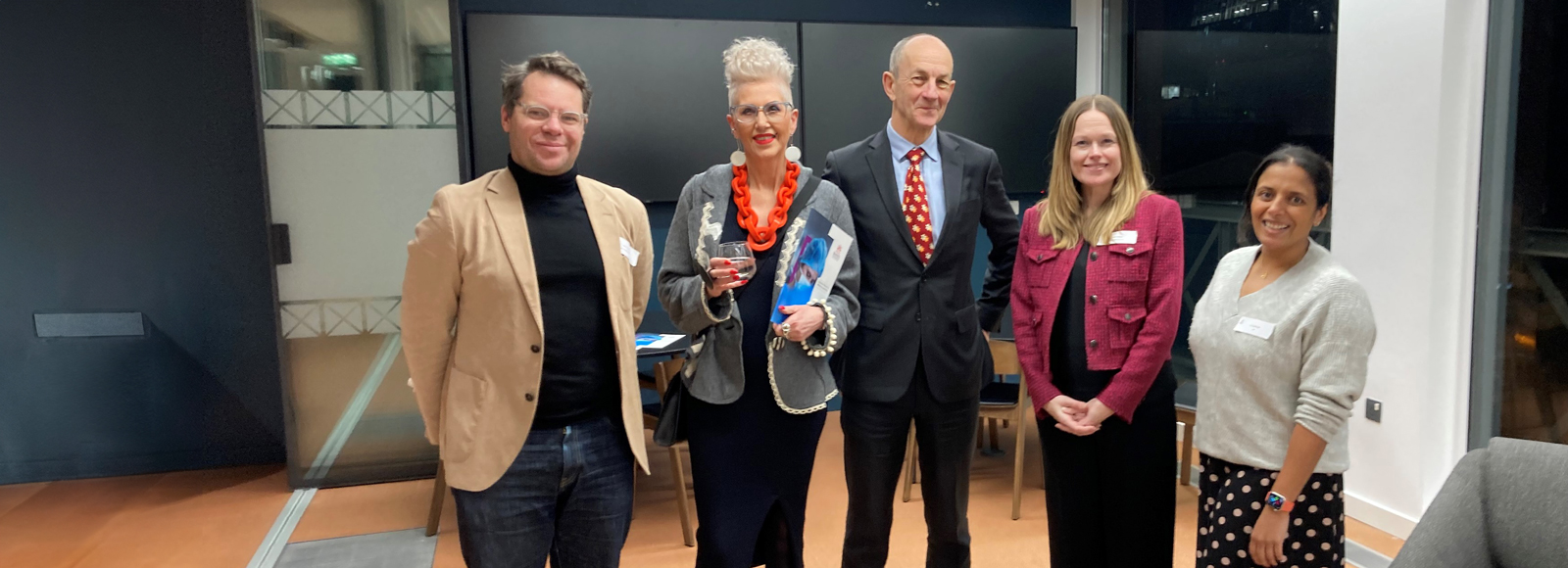Supporting doctors to lead the NHS into a brighter future
A groundbreaking medical leadership programme Bayes launched in 2017 has built the profession, developed leaders and changed lives, Bayes Dean Professor Andre Spicer said this week.
He was addressing the annual reception for alumni, healthcare leaders and current students hosted by the Executive Master’s Medical Leadership Programme (EMML). The programme offers advanced leadership training to doctors. A senior NHS England medical leader and two programme alumni also gave brief talks aimed at identifying “reasons to be cheerful about UK healthcare” when the NHS is facing sustained pressures.
Professor Spicer noted that the course was launched after research by EMML Course Director Professor Amanda Goodall. This confirmed that higher-performing organisations in many sectors – including healthcare – were disproportionately led by people with expertise in the “core business”.
Professor Spicer said: “We started with eight doctors now we have over 150 graduates who have changed healthcare in ways that we don't always see but which are very important. We've also realised that the basic thesis underpinning the programme – that experts make the best leaders – is correct and not just for medics. The graduates of this programme exemplify our role at Bayes: changing businesses, organisations and the professions for the better. They have gone on to change the workplace experience of their teams and improve care for patients.”
Bayes is now applying the principle of expert leadership to programmes designed for leaders in other public services and the creative sector.
Dr Chris Streather, NHS London’s Medical Director, alluded to the hit song, Reasons to be cheerful by Ian Dury and the Blockheads – noting that the punk rocker’s list included NHS spectacles and the smallpox vaccination programme.
Medical leaders can reinvigorate health service
While accepting that the NHS faced significant challenges – partly due to the covid pandemic – he said that effective leadership could help address those challenges, including by boosting workforce morale.
Recognition of the importance of comprehensive care for people with long term conditions in the community and of the need to switch resources to prevention are factors that Dr Streather is taking hope from. He also pointed to the role that communities, including faith groups, played in promoting vaccination and other health interventions during the pandemic. Those lessons should be embraced, he said.
Observing that 12 out of 37 NHS provider organisations in London are currently led by doctors, Dr Streather said he was promoting that trend seeking to colleagues across England.
EMML programme alumni Dr Kate Oakland, Chief Medical Information officer with HCA Healthcare, drew succour from history, suggesting that adversity prompts accelerated innovation. She pointed to the first mass production of penicillin during World War II, noting that the drug’s revolutionary impact had not been fully exploited for more than a decade after its discovery.
“History will look back at this period and say that we were facing adversity. There are pockets of innovation out there but innovation only works if you have leaders who are equipped to spread them out across society, operationalise them and execute them. And to do that you do really need great leaders and that does not happen by accident.”
With rare exceptions, such as former US president Barack Obama, “most of us need to be taught those leadership skills”, she said.
“Lots of other professions figured this out many decades ago. It took a while for the doctors to come to the party. Doctors of the past might well have been registrars one day and the next found themselves as Consultants or GP partners with a management and leadership role. You need to identify your weaknesses as a leader and that is ok because nobody has the full picture. Courses such as the EMML let you develop those skills away from the stress of the workplace and you can learn from peers. That way, we can drive the innovation that could have the same impact as mass produced penicillin did 80 years ago.”
Another alumni, digital health consultant and part-time NHS GP Dr Tejal Patel, highlighted the range of technological innovation arriving in the NHS as grounds for optimism. This ranges from AI to better population level data around disease and risk factors that allows targeted approaches.
However she warned that health leaders need to engage with their workforce and partners to ensure maximum benefit.
“It’s all very well bringing in the technology but if you can't align and engage with stakeholders, it's really hard to deliver it. We are seeing a lot of clinicians really engaging with technology as part of building portfolio careers."
"Initiatives like the NHS innovation accelerator and the clinical entrepreneur programme are encouraging clinicians to build these technologies so we can implement them. I think that's incredibly positive. It empowers clinicians and gives them some autonomy and agency which, hopefully, in a small way helps improve their wellbeing and keeps them in our clinical workforce.”
You can find more information on the Executive Master’s in Medical Leadership programme here. It is accredited by the Faculty of Medical Leadership and Management and is available by the Apprenticeship Levy in England. Applications for the September intake open in March.
